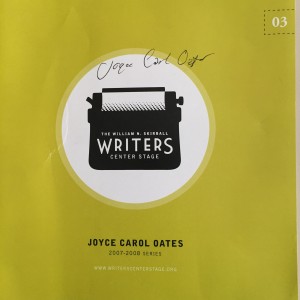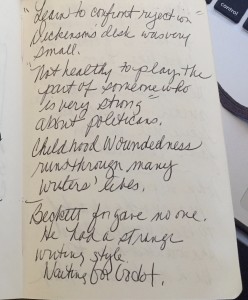Reading A Widow’s Story & Remembering 2008 JCO Talk
A spouse’s passing devastates.
A Widow’s Story, by Joyce Carol Oates, illustrates the first year after her husband, Raymond J. Smith, died on February 18, 2008. Oates was fortunate to have many devoted friends, but she still felt isolated and often overwhelmed by the weight of the estate and legacy of her beloved.
Just two weeks after Smith’s death, my daughter and I saw Ms. Oates speak in Cleveland, on March 4, 2008. Oates described the Ohio Theatre as, “a quaintly restored movie palace of the 1920s with a midnight-blue-felt sky twinkling with stars.” She said that 1,000 seats filled the theater and only half of those would be occupied because of the weather. 
In A Widow’s Story, Oates writes that her friends and lecture agent advised her against an engagement so soon after her husband’s death. She felt that if she cancelled that talk, she’d also cancel the next one, and the one after that. And to travel by air in a snowstorm! Her hosts remarked that they were glad she made it through alive.
The talk was entitled, “The Writer’s (Secret) Life: Woundedness, Rejection, and Inspiration.” In the book, Oates writes that the theme of woundedness was especially present that evening. She listed many writers who had turned woundedness into art. They were not geniuses because they had been wounded. They, having been wounded, turned their experiences into something, “rich and strange and new and wonderful.”
Reading Oates’ account of the evening sent me to my small Moleskine notebook from that period to find my notes from the talk that Oates gave in March 2008. Here are seven points I jotted down.
- Learn to confront rejection.
- It’s not healthy to play the part of someone who is very strong.
- Childhood woundedness runs through many writers’ lives.
- Samuel Beckett, who wrote the play, Waiting for Godot, forgave no one. He had a strange writing style.
- Twain wrote comedies and was very funny, but he had a father who didn’t like him.
- Hemingway hated his mother. She dressed him as a girl. His own father committed suicide.
- John Updike’s mother wanted to be a writer and she wanted him to be one, too. He would probably rather have been an artist, so in addition to his writing, he became an art critic.

After the event, I felt very content that I had spent the evening with my daughter and my favorite author. I didn’t know that Oates was feeling quite the opposite, quite wounded, in fact.
In an email to her friend, Jeanne Halpern, she wrote:
I called you at about 10 p.m. from howling-snowstorm-bound Cleveland last night after my reading for the Cuyahoga County Library, which went well despite the terrible weather; in my hotel suite at the Ritz—a very grand suite, with flowers, I was overcome with loneliness and dread, that I couldn’t call Ray as I’d always done at these times. . .
Oates said in her talk that it is not healthy to play someone strong. In A Widow’s Story, she writes that she often told her friends how overwhelmed she felt being on her own. It is interesting that the ability to reveal oneself as vulnerable shows great strength.
When we encounter people we admire, we often don’t appreciate that they are mere mortals who live their own personal struggles. Many of us would have still been curled in a ball on the couch two weeks after our spouse’s death. What makes legends like Joyce Carol Oates different from most of us is that they have uncommon strength and endurance when faced with tragedy.




Leave a Reply